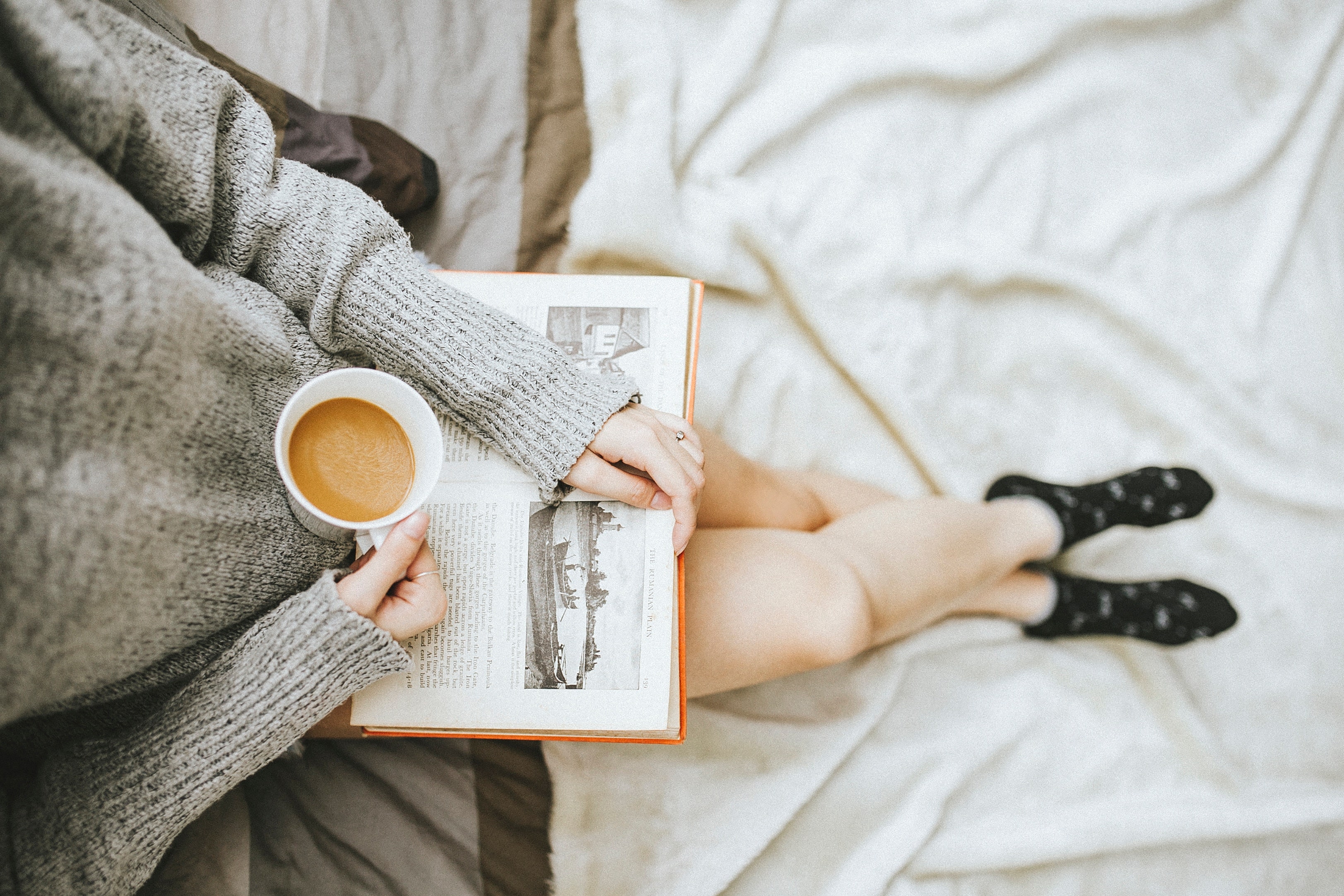About three years ago I found myself in a bit of a slump that I will call a “quarter-life crisis”. I was approaching my thirties and wasn’t sure what the future held for me. I found myself feeling empty, lost and dispassionate. I had approached my early to mid twenties full of life, with passion and goals I knocked out one by one. Having goals gave me something to strive for, something to grow towards and gave me purpose. But achieving each one seemed to leave me feeling more empty than fulfilled.
I had achieved what I had set out to do in my twenties; completed my Accounting degree and CPA, buying our first home at 25, had a wonderful wedding and travelled around the world and yet I wasn’t sure what was missing. I was surrounded by stuff, slowly but surely cluttering up our home, and found myself feeling more stressed and struggling to keep up with my insane schedule. I couldn’t see a way out and felt powerless to change my life.
One day as I was searching for some bottoms in my pants drawer I hit pure frustration. The struggle of fitting anything more into that drawer was just too much stress for me to handle. I grabbed everything out of that drawer and threw it on my bed. Somethings had to go, this drawer situation was just getting ridiculous. As I went through my pile I came across five pairs of shorts. Mind you I had not worn any of these more than once. I couldn’t believe that I even owned five pairs of these shorts or that I didn’t even know were there. I put the unwanted items in a pile and put my newly spacious drawer back into it’s row. I didn’t know at the time that that small moment would be the start of removing over half my possessions and lead me to the path of Minimalism.
Before I knew it I started decluttering the shirt drawer and the sock drawer and moved onto the closet finding more and more items with tags attached I had completely forgotten I had even bought! With each clothing item I pulled out and donated I found that I could breathe a little easier. I’d made space where there was no space before. I could now see what I had to wear at a glance. I wanted to know what other crap we had that I could declutter and soon moved onto the kitchen drawers, pantry, fridge, linen closet. Nothing went untouched.
Something had been sparked inside me and I found myself researching as much as I could about decluttering and organisation in any spare moment I had. I soon came across the term Minimalism. I spent the next two years decluttering over 60% of our possessions and learning as much about Minimalism as I could. I couldn’t read enough about it. I read about how Joshua and Ryan from The Minimalists decluttered their homes and completely changed their lifestyles of working 80 hour weeks and discovered Joshua Becker at Becoming Minimalist journey to a less cluttered life. Their stories made perfect sense to me. Less is more!
Inspired by No Side Bar’s article written by Jennifer Tritt Minimalism at fifty: What it means to me and upon celebrating my 31st birthday I thought now would be a good time to reflect on what Minimalism means to me at thirty as I head into a new and exciting decade of my life. Discovering minimalism a couple of years back has changed my life in so many ways and I am so glad to have stumbled upon this lifestyle now so I can make changes for the better earlier in my life. Minimalism can be a useful tool at any age, here is how it has affected my life in a positive way at thirty.
1. It means more space in my home
I moved out of home 6 years ago at the age of 25 and as the years went by, the clutter seemed to multiply. With each birthday and Christmas that passed, more and more stuff came into our home. Not to mention the trips to Kmart, Target and IKEA, always with the temptation to bring something home that I “needed“. Of course upon arriving home I would realise that I already owned three of the same striped shirts and that my new scented candle would not fit into my already overflowing candle drawer.
After discovering minimalism I pared back about 60% or more of our possessions. We now have space. This makes life easier whether it be space to prepare our meals with a clear bench, space on our dining room table to use it if we wish to eat meals at or work at, and not having to fight our closet or drawers to fit our clean clothes in. I can’t begin to imagine how much stuff we might have accumulated over the years and the anxiety that would have brought. I have never enjoyed space more and haven’t looked back.
2. It means being content with living in a smaller home
Our first home, which was to be our stepping stone into the home buying world was a 1300 square foot home with three bedrooms, a study and one bathroom. We figured it was big enough for us for now and within our budget and knew there was always the option to up size later on when we had the financial ability to do so.
After discovering minimalism the need to up size our home for a double garage, second bathroom and more master bedroom than we had, faded. Rather than wanting to go bigger, we made room for the essential and realised the benefits of a smaller home. I acknowledged that I didn’t need a second lounge room, more storage space or huge backyard to be happy. Minimalism at thirty has allowed me to be content in our smaller home.
3. It means becoming debt free faster
Since discovering minimalism the impact to our finances has been nothing short of amazing. After learning to appreciate what we have and limit buying things on impulse, we have reduced what we are spending. Rather than spending more, we made money – over two thousand dollars by selling unwanted knick knacks that were cluttering up our home and not adding value to us. This is money we have redirected to things or experiences that bring us value.
By being content with a smaller home we can resist the temptation to up size for something bigger and better. This will allow me to pay off my mortgage before I am 40 (or maybe sooner than that!) rather than at 55 or even later had I gone down the Jones trajectory and taken on a bigger mortgage.
By being more intentional with spending and planning ahead for purchases it means I can sleep easy knowing I am not trapped under mountains of consumer debt. My pay doesn’t go to regrettable purchases on my credit card that I can no longer remember. It can go to things I need or truly want and the things that are important to me like the roof over my head and food in the fridge.
Minimalism at thirty means I can avoid taking on unnecessary debt that would impede my future finances, happiness and opportunity to say yes to experiences and mean I can utilise my money more efficiently rather than by trying to keep up with an endless debt cycle.
4. It means I spend my money more thoughtfully and efficiently
When you know what truly adds value to your life and question each and every purchase you can save a lot of money. Thanks to minimalism I now make more educated purchasing decisions, sometimes holding off for a few months before making a decision to make sure I am spending my money in the most thoughtful and efficient way possible.
Rather than walking into a store with very little information, I ask family and friends or people in online communities for recommendations. I look up reviews, research the products available and features for what would be the most suitable for me as well as researching the price before buying any item over $100. I soon adopted this method across most of our spending as possible. We waste less as we shop with intention when we go to the grocery store and review annual bills to make sure we are getting value for money. This has really helped us save and reduce regretful, impulsive and excessive purchases.
5. It means knowing my values and putting myself first
Minimalism has shown me what my values are and how important it is to live by them. I am now much more selective with how I spend my time. I don’t dedicate large amounts of time to things I don’t enjoy or am not passionate about and spend time with friends who have similar values and who respect my choices, as I do theirs.
I used to be resentful on occasions when I had wasted my weekend doing things that other people enjoyed, or even times I thought I enjoyed them and then living with the consequences, such as staying out into the early hours and ending up sleeping away my Sunday mornings and still having to find time to clean, grocery shop and do what I wanted to with my weekend. Minimalism at thirty gave me more confidence to say yes to putting myself first even if sometimes that means disappointing others.
6. It means that I can plan to retire earlier
After discovering minimalism I discovered new lifestyles that didn’t revolve around working until you are 70 and revolving around working more to spend more. One blogger in particular is Mr Money Moustache who semi-retired with his wife at the age of 30 who is encouraging many ‘moustachians’ around the world to reach retirement age much earlier.
Through Minimalism I have reduced spending money on many areas in my life, which over time will allow me to save for the important things such as my retirement and to start thinking about that at 30, when I can take advantage of more compound interest benefits rather than an after thought as I approach the end of my working career.
7. It means I value experiences more
Now that I spend my money more efficiently and have eliminated most wasteful spending, I can spend my money guilt free on experiences that bring me joy and that I find value in. When I was younger I was a lot less willing to spend money on experiences. I didn’t place as high a value on them or travel as I did physical items. After all, why flutter your money away on a two week vacation when you could buy something for the house or some new outfits or buy something that you can keep for years, right?
Minimalism really helped me change my mindset on spending. I now see the value in experiences, not just stuff. Sure my new Dyson and Kindle are great and I find great value in them, but my honeymoon in Europe and road trip around Iceland and New Zealand have added so much joy to my life that no new TV or wardrobe ever could!
By buying less stuff and I now have the opportunity to have more experiences. I can now go out for a movie with my husband, a weekend away, or buy concert tickets and know that these things will truly add value to my life whilst creating wonderful memories with no clutter.
8. It means freeing up time and valuing my time more
A huge benefit of owning less is that I now spend less time maintaining my stuff. I have more manageable laundry, my smaller home is easier to clean and maintain, I have less stuff to organise and there is less paperwork coming into our house to take care of. All of these small changes have added up to time savings that I can dedicate to more important or fun activities.
The time savings goes further as I also reduced the time I used to spend shopping for nothing in particular. I now only shop from a list of items that I build that up over the space of a week or month and do my best to get in and out fast. And thanks to knowing when to say yes and no I’ve clawed back my weekends.
Minimalism gave me the mindfulness to walk away from the extra $100 I was earning each week at a second job so I could claim my Sundays back. I look back now and wonder how on Earth I use to rush off from where ever I was on a Sunday night to get to work, quickly shoving dinner down as fast as possible only to arrive at home wide awake at 12am with the thought of having to wake up for my full time job at 7am. Minimalism at thirty has shown me that money isn’t everything and that I am deserving of free time and time to unwind and that my decisions shouldn’t be purely based on money.
9. I live for each day, not just the weekend
Minimalism at thirty has given me the ability to enjoy every day and not just live for the weekends. I try and find happiness in everyday. I listen to an Audiobook on my commute, go for a walk occasionally at lunch and take notice of the birds or trees swaying in the breeze and feel the sun on my skin. Or catch up with a friend for a chat over a hot chocolate (I’m the 1% of the population that doesn’t drink coffee, great for the budget ;)).
When I find the time I write or play bass or sing or read a chapter of a book. Every day holds the potential for joy. Minimalism at thirty means I do my best to enjoy 365 days of the year and not write off the majority of them as a lost opportunity because they are work days. I may not be able to go and have a beach day or a picnic, but I can certainly find endless ways to make each day enjoyable.
10. I have learned the value of growth
Through the process of eliminating the focus on buying stuff and tying my happiness to physical possessions I was able to identify what was missing in my life; personal growth and contribution.
Discovering minimalism at thirty has encouraged me to grow. I now aim to learn something new each day or more often than not, it could be a new word in my vocabulary, a new budgeting or cleaning tip, or something musical related. Even if it’s just getting a little fitter each week or doing something to improve a relationship or your own mental health. It also gave me the courage to start my own blog and to contribute to helping others live a more intentional life. Knowledge and growth adds so much to our lives and shouldn’t be undervalued.
11. I put more value in my close relationships
Minimalism has highlighted to me the importance of relationships to my happiness. It has allowed me to invest in good relationships and reassess the less good ones. When I meet with friends or family I make more of an effort to be present, to keep my phone off the table, undistracted and paying attention to what they are saying.
I try and be more positive and supportive in anything my loved ones are passionate about and try and surround myself with people who also value this and encourage me to be the best person I can be. I’ve tried to make more time for the important people in my life, whether it regular date nights with my husband, just because family lunches and recently started a new tradition of gifting experience gifts to our nephews so we can take them out for a fun occasion.
12. I’m more mindful
Minimalism at thirty has showed me how to be more mindful. When I wake up of a morning and reach for my phone I pause and leave it on airplane mode a little longer. If someone or something is causing my stress I can recognise that sooner and take action or set new boundaries for that relationship. Instead of watching TV all day I write or go for a walk with my husband. When I see the sunset on my way home, I stand outside my home looking at it for a minute or so and soak it in rather then running into my house to start my list of errands. I’m loving being more mindful and hope to get better at it 🙂
How has minimalism benefited and changed your life? Please share your experience in the comments below 🙂








